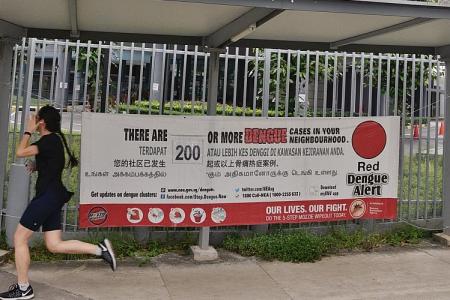Singapore set for a historic dengue high
16 deaths and over 14,000 cases since January, total to surpass 22,170 in 2013
Singapore is on track to record its worst dengue outbreak in its history this year.
More than 14,000 cases have been reported since Jan 1 with the total number expected to surpass the high of 22,170 reported in 2013, the National Environment Agency (NEA) said yesterday.
Eight people died of dengue fever in 2013 while there have been 16 deaths so far this year.
Experts have noted that case numbers are expected to rise further as Singapore is right in the middle of the traditional peak dengue season between May and September.
The NEA said there were 334 active dengue clusters islandwide as of Wednesday, well up on the 205 clusters three weeks ago.
It noted that "intensive" vector control operations are taking place at large clusters in Woodleigh Close, Aljunied and Geylang Roads, Bukit Panjang Ring Road, Leicester Road/Potong Pasir Avenue 1 and Bournemouth Road.
There has also been a higher rate of transmission within some clusters, including the one at Aljunied Road with 191 cases, the Bukit Panjang Ring Road cluster with 185 and Bournemouth Road with 175 infections.
Other clusters with a quick rate of dengue spread include those at Geylang Road, Geylang East Avenue 1, Brighton Crescent and Arnasalam Chetty Road/Kim Yam Road.
Most of the mosquito breeding grounds detected during NEA inspections are found inside homes and premises, said the agency.
It noted that while 75 per cent of the 1,328 clusters notified since the start of this year have been closed, "egregious mosquito breeding" continues to be detected.
One was a construction site within a dengue cluster in Potong Pasir Avenue 1.
A stop-work order was issued to the site on June 24 after it was found guilty of mosquito breeding on multiple occasions. The order will be lifted when preventive measures have been correctly carried out, said the NEA.
Other premises found with multiple mosquito breeding habitats include residential premises within dengue clusters and common areas of Housing Board estates managed by town councils or residents' committees.
The NEA said: "(This shows) some owners of premises and occupiers are still not carrying out the necessary basic vector control checks, despite the extensive outreach on prevention over the past few months and the current serious situation."
There will be heavier penalties for households committing breeding offences from July 15.
Households that have mosquitoes breeding in more than one place, or where breeding is detected even after they have been served legal notice that they are in a dengue cluster, will be fined $300. Repeat offenders will be given heftier penalties or charged.
Get The New Paper on your phone with the free TNP app. Download from the Apple App Store or Google Play Store now


